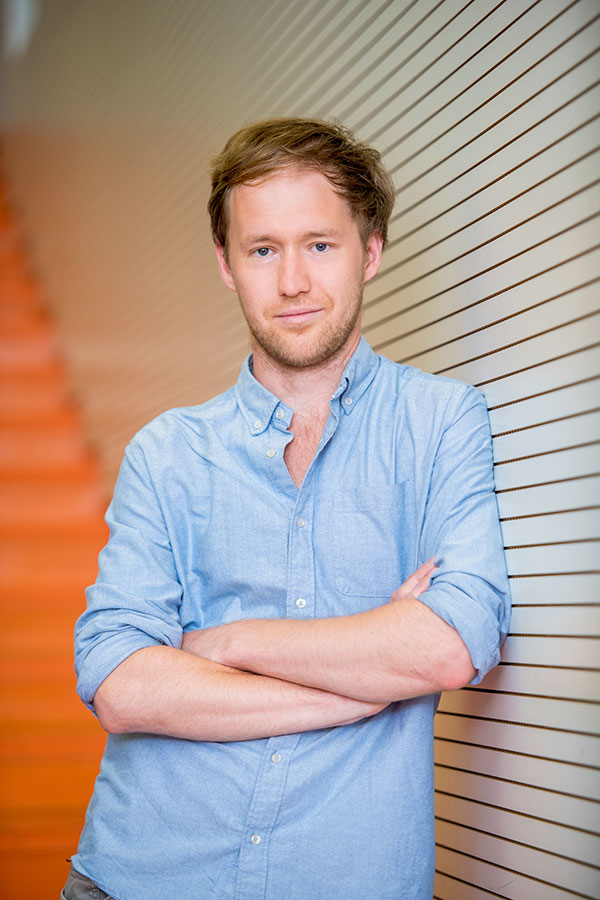Researcher stories: Started as a master thesis, ended up as a publication

Áron researched programmes preventing cyberbullying, he had his first publication in this topic, then his interest was attracted by the relation between democratic institutions and corruption. He is still at the very beginning of his career, but he feels he is quite suited to research tasks.
‘I have already decided that I would like to do mainly research work. I will partly work in applied area, and I would like to have an academic career, too, and at the moment I think that these two can get along nicely with each other’, said Áron Hajnal at the beginning of the conversation. At the age of 27, he already has a Corvinus Research Excellence prize awarded to PhD students, a Q2 publication and several scientific articles presently in the commenting phase.
Beside his PhD studies, he has a part-time job at the Budapest Institute. The Budapest Institute is a company operating on project basis, and produces analyses in political subjects (e.g. employment policy, tax policy, ‘good governance’) for various customers (e.g. the European Commission, local governments and civil organisations). Quite a few of these analyses are used to produce scientific publications.
Q2 publication from master thesis
When he started to work on his master thesis, all he knew was that it would be a good idea to find a subject related to crime prevention. ‘This was recommended by my supervisor, Sándor Csengődi, because this topic was suitable for an application for a newly announced scholarship, so this is how I became immersed in research related to cyberbullying.’
He found that cyberbullying was becoming an increasingly important topic, especially among young people. According to some international surveys, more than 10 per cent of children have already been victims of cyberbullying.
Cyberbullying can sometimes be more harmful than simple bullying, as the aggressor does not see the effects of his/her acts, so does not feel that he/she hurts a flesh and blood person with his/her acts
explains Áron about the reasons why the topic should be given more attention.
Later, the master thesis became a TDK paper, and the topic was the analysis of education programmes worked out for young people to raise their awareness about cyberbullying, and Áron had the first place with it in the TDK. Then his supervisor suggested that it would be worthwhile producing a publication from it. Finally – after a thorough reworking – the article was published in the journal called Intersections of category Q2.
The focus in the article was quite different from the original paper. My TDK paper discussed the analysis of an education programme in district 12, based on the considerations defined by myself. The article, however, examined what factors could make programmes preventing cyberbullying successful
explains Áron about his research. The research applied quantitative methods to examine the success factors of prevention programmes, based on 20-25 articles examining already implemented programmes. It turned out that programmes containing so-called social-emotional learning programme elements (too) are usually more effective.
Áron said that the approval process of the study was ‘relatively pain-free’. Two referees commented on the text, one of them asked for a few small changes only, while the other was more critical, but neither of them found faults with the empirical analysis chapter.
Democratic decline and redistribution
Áron is presently doing the Corvinus PhD programme, studies political sciences, and within that he examines the relation between the decline of democratic institutions and corruption. He is producing a portfolio-based thesis, i.e. he is writing 3 different but interrelated articles.
He is now working on the manuscript of the first article, which is about democratic corruption patterns in countries that suffered democratic backsliding, and about policies influencing that. While it may sound a logical assumption that the lower the level of democracy, the more widespread the corruption, in some less democratic countries the state is very successful in reducing certain types of corruption. The study examines what factors decide whether or not the government terminates a given type of corruption, or, on the contrary, turns a blind eye or even encourages that.
Focusing on Hungary, the study examines the following types of corruption in five ‘mini case studies’: police bribery, healthcare, sports financing, distribution of tobacco product sales concessions and bribery in high-level public administration.
According to the results, it is mainly the so-called vertical transaction costs that determine whether the government intervenes in the case of various corruption types (and if it does, in what way). Vertical transaction costs show how expensive it is for the state to ‘supervise’ a given type of corruption and use it for influencing the social allocation of resources. Based on the results, the state should maintain corruption types where little financial or other resources are required to efficiently supervise the process of redistribution.
In the healthcare system, for example, the distribution of gratuities is too far from the top political leadership, and it would be too expensive to supervise it, therefore it was terminated with high salaries to doctors and with significant punishments. However, in the case of tobacco shop concessions, central decisions determine who may open a tobacco shop, so the political leadership is able to control redistribution at a low cost and efficiently in this area
as Áron explains the effect of vertical transactions costs in practice.
As to the future, he would like to finish the PhD as soon as possible, while keeping his policy analyst job, too, and later he would be interested in a scholarship abroad.